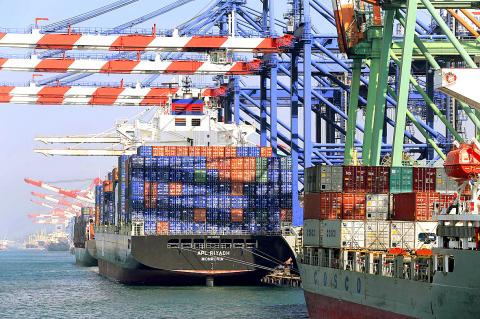The value of export orders dropped 5.9 percent annually and 4.1 percent monthly to US$35.79 billion last month, dragged down mainly by declining orders from China and Hong Kong, the Ministry of Economic Affairs said yesterday.
The value of orders from China and Hong Kong fell by US$1.17 billion from a year earlier to US$8.98 billion last month, accounting for 52.7 percent of the US$2.22 billion annual drop in overall export orders last month, the ministry said.
“The increasing localization of supply chains in China is an issue that we have to face seriously,” Department of Statistics Director-General Lin Lee-jen (林麗貞) told a news conference in Taipei, adding that last month’s data on orders from China and Hong Kong marked the fifth consecutive month of decline, excluding Lunar New Year holiday factors.

Photo: CNA
Weaker-than-expected growth in China has also affected demand for Taiwanese goods, Lin said. She said it would be worth observing if the annual decline in export orders from China and Hong Kong would extend throughout the year, citing the faster-than-expected rise of supply chains in China.
“Aside from flat panels, we noticed that Taiwan’s integrated circuit design, packaging and testing service sectors have also been facing increasing challenges in China,” Lin said.
In addition, the weak demand for PCs in Europe and handheld devices in emerging markets also affected the performance of the nation’s electronics and precision instruments industries, Lin said.
Apart from the information and communication technology industry, which saw a 2.3 percent annual increase in orders to US$9.7 billion, the ministry’s report showed broad declines in orders for electronics, precision instruments, basic metals, petrochemicals and machinery products last month from the same period a year ago.
By country, the US was still Taiwan’s largest export destination, with orders increasing 5.2 percent to US$9.79 billion from the same period a year ago, Lin said.
However, the annual growth rate for US orders was slower than the 14 percent registered a month earlier, an indicator of weakening demand as the product cycle for Apple Inc’s iPhone nears a refresh, Lin said.
Orders from China and Hong Kong, Europe, ASEAN and Japan all saw an annual decline last month, with orders from China and Hong Kong and Japan plunging by double-digit percentage points from a year ago, Lin said.
Lin said the ministry forecasts the value of this month’s export orders to be flat or decline from last month’s US$35.79 billion. As such, the value of export orders this month will likely decline from last year’s US$38.82 billion, she said.
The value of export orders totaled US$180.47 billion in the first five months of this year, 0.6 percent less than in the same period last year, the ministry’s data showed.
The total value for the first half of this year is expected to be less than the US$220.47 billion in the same period last year, Lin said.
However, Lin said the ministry remains optimistic on export orders in the second half of this year, citing the upcoming launches of Microsoft Corp’s Windows 10 operating system and new Apple products.

NATIONAL SECURITY THREAT: An official said that Guan Guan’s comments had gone beyond the threshold of free speech, as she advocated for the destruction of the ROC China-born media influencer Guan Guan’s (關關) residency permit has been revoked for repeatedly posting pro-China content that threatens national security, the National Immigration Agency said yesterday. Guan Guan has said many controversial things in her videos posted to Douyin (抖音), including “the red flag will soon be painted all over Taiwan” and “Taiwan is an inseparable part of China,” while expressing hope for expedited “reunification.” The agency received multiple reports alleging that Guan Guan had advocated for armed reunification last year. After investigating, the agency last month issued a notice requiring her to appear and account for her actions. Guan Guan appeared as required,

A Vietnamese migrant worker yesterday won NT$12 million (US$379,627) on a Lunar New Year scratch card in Kaohsiung as part of Taiwan Lottery Co’s (台灣彩券) “NT$12 Million Grand Fortune” (1200萬大吉利) game. The man was the first top-prize winner of the new game launched on Jan. 6 to mark the Lunar New Year. Three Vietnamese migrant workers visited a Taiwan Lottery shop on Xinyue Street in Kaohsiung’s Gangshan District (崗山), a store representative said. The player bought multiple tickets and, after winning nothing, held the final lottery ticket in one hand and rubbed the store’s statue of the Maitreya Buddha’s belly with the other,

‘NATO-PLUS’: ‘Our strategic partners in the Indo-Pacific are facing increasing aggression by the Chinese Communist Party,’ US Representative Rob Wittman said The US House of Representatives on Monday released its version of the Consolidated Appropriations Act, which includes US$1.15 billion to support security cooperation with Taiwan. The omnibus act, covering US$1.2 trillion of spending, allocates US$1 billion for the Taiwan Security Cooperation Initiative, as well as US$150 million for the replacement of defense articles and reimbursement of defense services provided to Taiwan. The fund allocations were based on the US National Defense Authorization Act for fiscal 2026 that was passed by the US Congress last month and authorized up to US$1 billion to the US Defense Security Cooperation Agency in support of the

CLASSIFIED BRIEFING: The ministry said the special budget focuses on building a comprehensive defense system and strengthening the domestic defense industry The Ministry of National Defense yesterday released information on seven categories of weapons systems to be procured under a stalled NT$1.25 trillion (US$39.57 billion) special defense budget, including precision artillery, long-range missiles, air defense anti-tank missiles and more than 200,000 uncrewed aerial vehicles (UAVs). The Executive Yuan approved a draft version of the budget on Nov. 27 last year and submitted it to the legislature for review. The legislature’s Foreign Affairs and National Defense Committee yesterday invited Minister of National Defense Wellington Koo (顧立雄) to deliver a classified briefing and answer questions at a closed-door session. Koo said he hoped to provide lawmakers